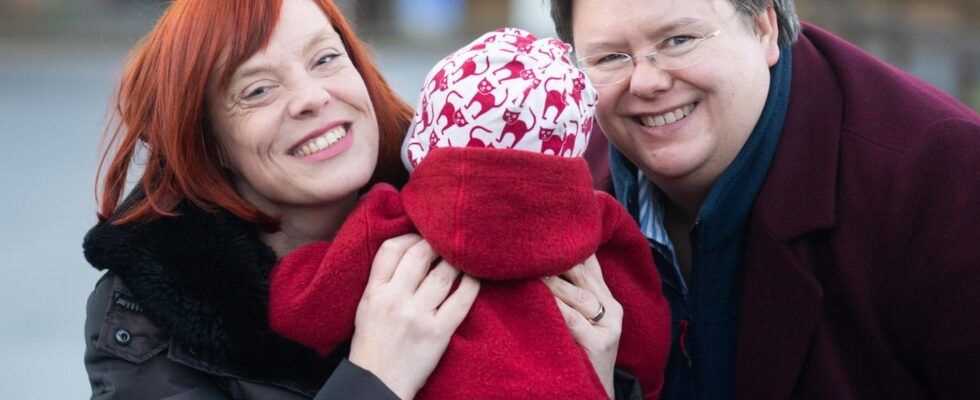Rainbow family
When you are legally not allowed to be a mom to your child
© Julian Stratenschulte / Picture Alliance
Almost exactly four years ago the Bundestag voted in favor of “marriage for everyone”. The trigger was a comment by Chancellor Angela Merkel at the BRIGITTE Live Talk. Gesa Teichert-Akkermann and Verena Akkermann are now fighting to make this a “family for everyone” .
For many parents, the birth certificate is a natural piece of paper that is neatly stapled away after receipt. But for Gesa and Verena it means the world. And at the same time this world collapsed when they held the certificate in their hands for the first time after the birth of their daughter and had to discover that only Gesa Teichert-Akkermann was recorded as the birth mother. Her wife Verena, also Paula’s mom, was not listed – as if she didn’t exist. On paper, Gesa is a single parent.
A law with loopholes
Parenthood is regulated in Germany in the Descent Act. This means: A “father” comes into question as the second parent – but not a second mother. In the case of lesbian parents, only the woman who gave birth to the child appears as the mother in the birth certificate. Gesa and Verena were aware at the time that there would only be one name on the document. But when they saw it in front of them in black and white, they began to cry in fear and bewilderment.
Because her situation is special: Gesa is in a wheelchair, and when she got Paula, she was already 44. The birth was a great risk for both her and Paula. And this is exactly what has tightened the legal situation again: If Gesa had died giving birth, Paula would now be an orphan, although Verena is also her mother – just not legally. If Verena died, Paula would also be disadvantaged: she would have no pension entitlements, would not be entitled to inheritance, would not receive a half-orphan’s pension. At the moment Verena is not even allowed to pick her up from the daycare without Gesa’s authorization.
A fight for rainbow children
“It’s like a sword of Damocles that hangs over you all the time,” says Gesa. “If something happens, our child is not protected. Paula is discriminated against for something that she has not made up her mind.” Although there is the possibility of being recognized as a legal parent through a “stepchild adoption”, this often takes years and can be very stressful for families. Gesa and Verena saw only one way out: They sued for their birth certificate to be corrected and for Verena’s motherhood to be established. After all, they find that Paulas and her fundamental rights have been seriously violated: They are neither equal before the law (Article 3), nor does the state protect their marriage and family (Article 6).
“I have been legally made a single parent, even though I am married”
For two years, the two fought their way through different instances. With their initiative #PaulaHatZweiMamas they mobilized tens of thousands. Two months ago there was a huge success: the Higher Regional Court in Celle referred Gesa’s and Verena’s case to the Federal Constitutional Court. Because the judges: inside consider the current regulations in the right of parentage to be unconstitutional.
For Gesa and Verena – and many other queer couples, some of whom went to court themselves – this is a milestone. Now they want to put more pressure on politics. “After all, parliament is responsible for the legislation and not the constitutional court. It is embarrassing that it is not doing its job,” says Gesa.
“A punch in the face”
One solution would be a so-called “co-motherhood”, which could be decided by marriage or a court decision. Or you could rename the terms “mother” and “father” on the birth certificate to “parent 1” and “parent 2”. Gesa and Verena are currently getting a lot of approval from the Greens, the SPD, the Left and parts of the FDP. Above all, they receive great support from Ulle Schauws, the Greens’ queer policy spokeswoman. In the meantime, they even hoped to bring about a change in the law during this legislative period. But the CDU blocks itself. “That’s a slap in the face for all rainbow families,” says Gesa.
How their legal dispute will end is currently uncertain. Likewise, whether the CDU is still ready to negotiate in the next few weeks. Gesa and Verena do not give up hope. If the reform doesn’t work out now, they want to keep trying after the election. One day, they hope, Paula will be able to proudly say: “My mothers have reformed the parentage law”.
Source used: Interview

